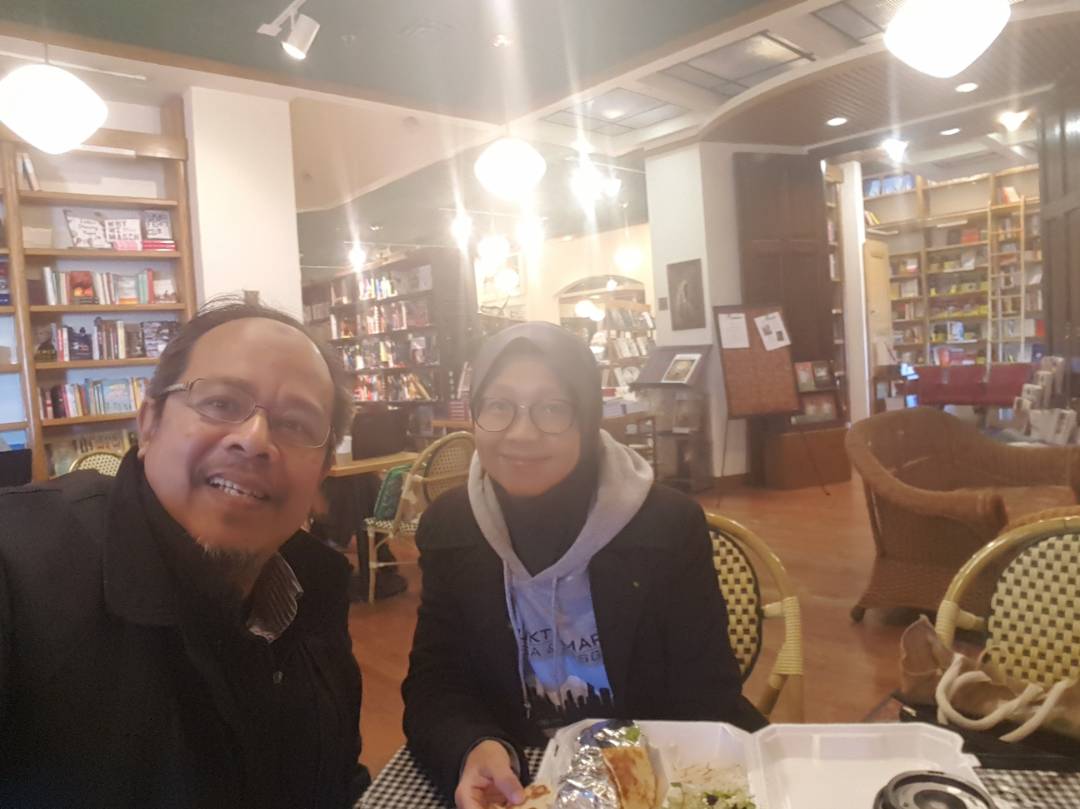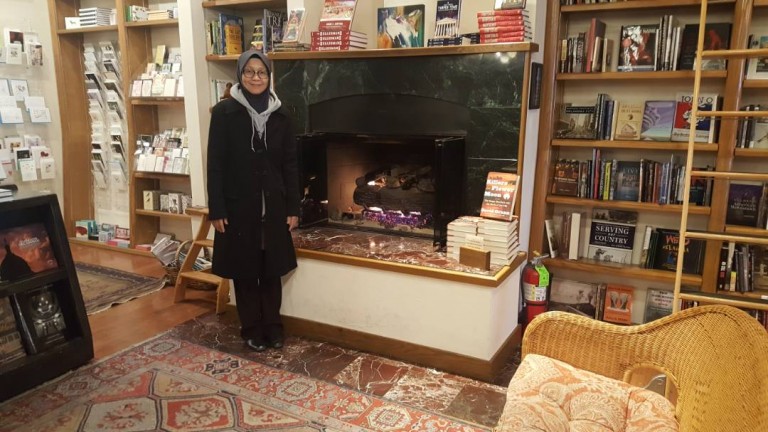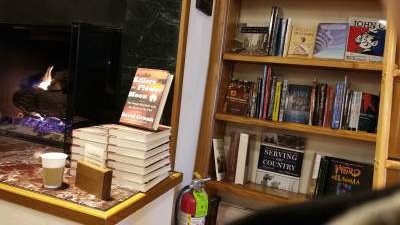It wouldn’t be right to judge a place based on a short trip. But I wanted to have snapshots of Oklahoma, and right now I’m in the perfect spot. I’m at the Full Circle Bookstore, Oklahoma City. It’s snowing outside, but I’m all warm in front of a fireplace, where a little fire dances. I’m thinking: What a generous soul the owner of this bookstore is! I have never experienced an ambience as cosy as this anywhere else. Too often, bookstores make space just for you to walk through the aisles and little else. This bookstore is different. Nestled in a corner is a café dishing up food and drinks with homely looking chairs and tables. Next to it is a fireplace with sofas for you to sit back, browse a page or two of your favourite author’s latest book. The café notwithstanding, the generous owner has another, bigger fireplace, where book enthusiasts may help themselves to free flowing coffee.

The faithful traveling companion, Ahmad Fakhri and yours truly.
 Real logs burning at the fireplace. On my left are all kinds of literary work on Oklahoma.
Real logs burning at the fireplace. On my left are all kinds of literary work on Oklahoma.
How I wish I could call this place my home for the next six months so I could devour
as many books as I could.

Before me on the shelves, stood a variety of books on Oklahoma. Some promised past tales of American natives. I grabbed one and began to read. Flipping through the pages, I went right to the final chapter: The Oklahoma bombing in 1995. I’m thumbing through a book recounting history; not so pleasant to be exact, the tragedy a stark contrast to the calm ambience I was in. I have heard about it way earlier, but when you’re in a city half a world away, violence in another country with a different set of rules, different laws made it feel surreal.
Facts of the case: In 1995, Timothy McVeigh parked a rental truck packed with 4,800 pounds of explosives outside a building in Oklahoma City. It exploded and killed 168 people, including 19 children. It’s difficult to imagine that a city this serene experienced a man-made catastrophe of such magnitude. I ran through reports on the bombing later and I found McVeigh’s apparent lack of remorse particularly troubling. Equally disturbing was the fact that McVeigh was a decorated army veteran. How could a person trained for years to defend his people turned against his own kind?
As a parent, I couldn’t begin to imagine how McVeigh’s parents must have felt on hearing the news. Neither could I imagine the grief and shock of families losing their loved ones.
We cannot change what has happened in the past, but we could look at the past and learn from it. It might do us good if we were to give a thought to what we parents and educators could do to raise our children in such a way as to make them averse to such horrific acts.
It appeared that McVeigh lost patience mainly with prevailing conditions, notably the authorities. His story is about giving up. He gave up on the people around him. He lost all sense of hope. To him, things could never get better. The McVeigh case offers lessons for us parents and educators, what to do and what not to do, in raising our children. On this note, let us look at three dimensions of nurturing: Spiritual, Intellectual & Emotional.* These three dimensions are by no means exclusive; at some level, they do overlap with one another.
Spiritual Dimension
McVeigh didn’t believe in eternal justice. He was so enraged with the way things were in his country, and how he was treated as a decorated war veteran. A person is unlikely to commit such a crime if he believes in an All-Wise God. Just focus on what you can do, knowing that certain things are beyond your control and understanding. Notice that this is entirely different from blaming God for the things that fail to work or evil outcomes in the world over. Believing in A Just God means you believe with conviction, without doubt that God All-Knowing has the full truths and will ultimately reward or punish people according to their intentions and deeds, either in this world or in the next. Although he was raised as a Christian, in an interview before his execution, McVeigh denied believing in hell or heaven.
Lesson for Parents: Plant the seed of a Loving, Kind and All-Wise God early. Let your child grow accustomed to the idea of an Unseen God, Ever-Seeing God. Social problems like drugs, alcoholism, suicide, self-harming, bullying and juvenile delinquency are less likely if a child experiences a solid connection with The Creator. There’s A Powerful Someone to turn to. Always.
Note: According to researcher Lisa Miller, Ph.D., associate professor of psychology and education, Columbia University, Teachers College, New York City, a teenager who has a strong sense of a Loving, Higher Being is 60% less likely to be depressed.
Intellectual Dimension
Children have a high degree of inquisitiveness. They want to know why things happen; even if they know at some level that the adults around them might not know the answer. At the very least, their concerns must be acknowledged, giving them a way to express their thoughts and energies. Check out, for example, Philosophy for Children, or P4C for short (https://p4c.com/). It allows children to air their views in an intellectually safe and respectful environment. No such thing as a stupid question. Children get to ask questions which in another place might be viewed as sensitive, without the fear of being judged. Apart from imbuing critical thinking skills, P4C also nurtures empathy.
Lesson for Parents:
In a world where children are bombarded with conflicting and confusing messages every single day, they need to look at things at a deeper level, analyse what’s thrown at them, differentiate between right and wrong. Make time to have intellectual discussions whenever you can: Do you know what happened at such-and-such a place last week? What/Who do you think caused it? How could things turn out differently?
Emotional Dimension
According to Wikipedia:
McVeigh’s biographers, Lou Michel and Dan Herbeck, quote McVeigh, with whom they spoke for 75 hours, on his attitude to the victims:
To these people in Oklahoma who have lost a loved one, I’m sorry but it happens every day. You’re not the first mother to lose a kid, or the first grandparent to lose a grandson or a granddaughter. It happens every day, somewhere in the world. I’m not going to go into that courtroom, curl into a fetal ball and cry just because the victims want me to do that.
McVeigh was not able to see the extent of the hurt he had inflicted on others. He couldn’t feel for the people he grievously hurt and their families. He didn’t appear to regret what he did, he showed a lack of understanding for his innocent victims, he wasn’t able to put himself in their shoes. One wonders: Has he always been like that growing up? Or was his emotions numbed through his life experiences?
Lesson for Parents: Help your child recognise their emotions, happiness and pain. Especially help them acknowledge and work through emotional pain, fear and anxiety so they learn taking it out on others only makes the world worse than it is. Where appropriate, being grateful for what you have helps reduce emotional pain. Fear and anxiety at times need to be confronted: What exactly are you afraid of? Is it real or imagined? For older children, ask: What are the facts? Are we looking at things in a balanced way? Or are we just seeing what we want to see? There’s such a thing as confirmation bias — you notice only things that support your view. Hence, if your worldview is negative, you’d notice anything that adds up to this position.
*The Physical & Social Dimensions, as I see it, tend to manifest themselves in one or more of these three dimensions and therefore, are not elaborated upon in this article.



